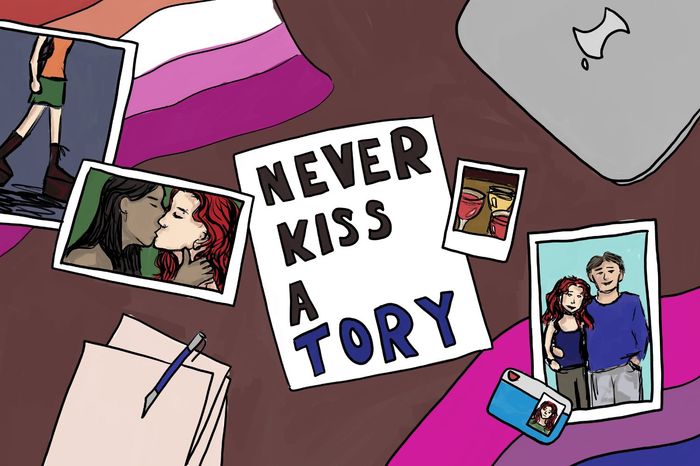Should I stay or should I go? Braving the friendship break-up
Lucia Trivass-Berlanga dwells on the difficulties of a platonic break-up

It seems to be the season of friendship break-ups. Well, at least for me. Perhaps the readership of Varsity’s Lifestyle section have not recently encountered this social phenomena. Every time I write an article, I grapple with the question of whether I am covering a widespread, zeitgeist-aligned topic readers will relate to, or if this is simply another ‘me problem’ that would be better left in my diary.
The most culturally relevant artefact I can connect to the concept of friendship break-ups is Charli XCX’s album Brat. So, imagine ‘Girl, so confusing’ without the Lorde feature or traces of any desire to repair the relationship. Keep the frenzied paranoia and insecurity, add some docile acceptance of the awkward realities of a looming break-up, and that might accurately represent my version of Brat summer. Nobody has decided to work it out on the remix with me and, honestly, I don’t want them to. Sometimes things are beyond repair. No amount of heart-to-hearts, honest conversations, or full disclosures can mend certain structural issues.
“Nobody has decided to work it out on the remix with me and, honestly, I don’t want them to”
Friendship break-ups as a concept evoke failure. The term is garishly Year 9 coded, with strong connotations of immaturity, misplaced self-seriousness and frivolity. It demonstrates a clear lack of judgement on your part, for failing to recognise an incompatible friend, or worse, a genuinely nasty person, in the early stages of your acquaintance.
It also suggests a lack of resilience on your part to weather the tougher moments of friendship. Maybe you lack compassion and cannot accept that your friends are flawed, complete human beings, not just props to decorate your social life with. You might even use the embarrassingly neoliberal rhetoric of ending friendships that “don’t serve you,” myopically centering your view of friendship on how they gratify and fulfil you. Too often, it seems people treat the art of friendship as collecting and curating interesting, fun people like they’re objects for display, distancing themselves once the shine of the new toy wears out.
However, sometimes friendship break-ups emerge organically rather than out of a contrived desire for intrigue or childish pettiness. Chats with friends you’ve known for years start to have the stumbling awkwardness of a meeting between near-strangers, and what were once interesting differences between you become irreconcilable gulfs in perspective. Or, you get to Week 3 of term and realise you now rarely see someone you once saw everyday – and have barely noticed their absence. Someone’s unique quirks become their grating annoyances. You notice a lack of desire to engage in more than superficial niceties with someone you once shared secrets with. These are pivotal shifts in your interpersonal relationships, and shouldn’t be considered frivolous because the emotions involved are (mostly) platonic rather than romantic.
“If you think someone deserves an explanation for why you no longer want to be their friend, be upfront and tell them”
Now there is one element of a friendship break-up that I am strongly opposed to: the break-up text. If you think someone deserves an explanation for why you no longer want to be their friend, be upfront and simply tell them. Normally, however, people are mutually aware of the slow disintegration of their bond, and there is no need to espouse one’s negative view of the other party’s character over WhatsApp. Surely the break-up text is as embarrassing as it is unnecessary. Surely we are more sophisticated social animals than that.
At least, that’s what I thought. I recently attempted to distance myself through what I considered to be the highly skilful social manoeuvre of gradually phasing out all contact with a certain individual. Unfortunately, just as I was congratulating myself on my wily ways and social ingenuity, the former “friend” broke into my college library, thus propelling me into an ambiguous near-stalking experience. My fight or flight impulses are now triggered by slight, badly-shaven men who wear ill-fitting skinny jeans (which is, unfortunately, a larger proportion of men in Cambridge than I would want it to be).
So, maybe I have been too passive and conflict-averse. In my desire to avoid feeling guilty for engaging in something as silly sounding as a friendship break-up, I had maybe driven an individual to near-criminal activity. Consequently, experience tells me to advocate for a more direct approach to dealing with such tenacious individuals. Perhaps it is better to be upfront, rather than dangling your friendship over people like a cruel taunt. Perhaps the break-up text, maybe followed by a block, is a necessary, albeit crude, way to securely terminate a friendship.
Friendship break-ups have promise, though. They’re very symbolic: an end followed by rejuvenation, rebirth and renaissance. This would probably make more sense if it was Lent term and the beginning of Spring was the backdrop to my platonic tumult. Inconveniently, we are in the season of decay and degeneration, so perhaps social rebirths will have to be postponed for a few months.
 News / Uni Scout and Guide Club affirms trans inclusion 12 December 2025
News / Uni Scout and Guide Club affirms trans inclusion 12 December 2025 News / Pembroke to convert listed office building into accom9 December 2025
News / Pembroke to convert listed office building into accom9 December 2025 News / Cambridge Vet School gets lifeline year to stay accredited28 November 2025
News / Cambridge Vet School gets lifeline year to stay accredited28 November 2025 Features / Searching for community in queer Cambridge10 December 2025
Features / Searching for community in queer Cambridge10 December 2025 News / Uni redundancy consultation ‘falls short of legal duties’, unions say6 December 2025
News / Uni redundancy consultation ‘falls short of legal duties’, unions say6 December 2025









